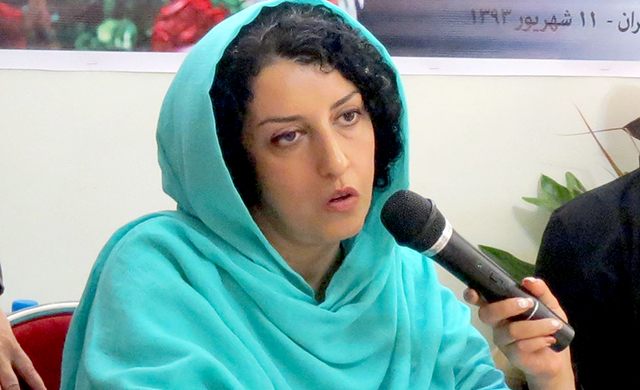Prominent Human Rights Defender Narges Mohammadi Goes on Trial Behind Closed Doors

The trial of human rights activist Narges Mohammadi, postponed four times since its original date of May 3, 2015, finally began on April 20, 2016 at Branch 15 of Tehran’s Revolutionary Court.
Mohammadi, who was detained for her peaceful activism, has been charged with “collusion and assembly against national security” and “membership in the [now shuttered] Step by Step to Stop the Death Penalty.”
The trial, presided by Judge Abolqasem Salavati, was held in the presence of Mohammadi’s lawyer, but was closed to the public. No information has emerged from the proceedings so far, her husband, Taghi Rahmani, told the International Campaign for Human Rights in Iran.
“Unfortunately, the officials have denied Narges the right to be in contact with her children,” he said. “Every prisoner has the right to call his or her relatives on the phone, but Narges was allowed to call her kids just once in the past 10 months.”
“Speaking to her children can certainly have a positive impact on her morale and physical health, but they have denied her this right,” Rahmani told the Campaign.“Narges is suffering from two things, pulmonary embolism and nervous paralysis, and the doctors say prison conditions are like poison for her,” he added. “Narges has served a part of her sentence and she can qualify for parole on medical grounds, but so far she has been denied this right and none of the authorities are looking into the family’s demands.”
Winner of the 2011 Per Anger Prize for her activism in human rights, especially women’s rights, Mohammadi has been held virtually incommunicado for more than 10 months. During her entire detention she has only been allowed to speak to her children once on the phone, on April 2, 2016.
Throughout her imprisonment, Mohammadi has been suffering from serious health problems. Political prisoners in Iran are singled out for particularly harsh treatment, which often includes denial of medical care, in direct violation of Iran’s own laws and prison regulations.
After Mohammadi discussed Iran’s human rights issues with the European Union’s foreign policy chief Catherine Ashton at the Austrian Embassy in Tehran in March 2014, the security establishment significantly increased pressure on Mohammadi, subjecting her to months of harassment and multiple interrogations. She was arrested on May 5, 2015.
She was first arrested in 2009 and sentenced to 11 years in prison in October 2011 on charges of “assembly and collusion against national security,” “membership in the Defenders of Human Rights Center,” and “propaganda against the state.”
The Appeals Court reduced her sentence to six years in prison, and in 2013 she was released from Zanjan Prison on 600 million toman (approximately $200,000) bail for medical reasons. Her arrest in May 2015, ostensibly on these older charges, was more accurately related to Mohammadi’s visit with Ashton and her continued peaceful activism.






